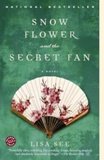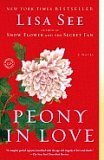These days, every writer --- and publisher too, for that matter --- will tell you that it's important to reach out to book clubs. But few people talk about how important book clubs are to writers. I don't mean that a book's success or failure can hinge on whether or not book clubs buy our books. (Don't get me wrong. This is a wonderful thing and very important, and I'm grateful to all the book clubs who have bought my books.) I'm talking about something else. I'm talking about the inspiration and courage book clubs give writers to sit down, be vulnerable to emotions (and possible criticism), and write from the heart.
 Let's go back in time about five years. I think I had a pretty good reputation as a writer. I was "critically acclaimed, meaning I got good reviews but not many people read my books. When I sat down to write Snow Flower and the Secret Fan, people --- friends, other writers, folks in publishing --- told me, "No one's going to read that book." They had all sorts of reasons: it took place in the past. It took place in China. It was about women. Worse, it was about women's friendship. It was sometimes heartbreakingly sad. And that footbinding stuff! Yuck! No one's going to read it.
Let's go back in time about five years. I think I had a pretty good reputation as a writer. I was "critically acclaimed, meaning I got good reviews but not many people read my books. When I sat down to write Snow Flower and the Secret Fan, people --- friends, other writers, folks in publishing --- told me, "No one's going to read that book." They had all sorts of reasons: it took place in the past. It took place in China. It was about women. Worse, it was about women's friendship. It was sometimes heartbreakingly sad. And that footbinding stuff! Yuck! No one's going to read it.All that doom and gloom was actually quite freeing. If you think no one's going to read your book, then you can write whatever you want, and I did. Well, to my great surprise, everyone was wrong. Now I can look back and say with absolute certainty that the success of Snow Flower was due 100% to book clubs. Over these past four years, I've visited or talked by speaker phone to something like 200 book clubs. It's been in these conversations --- which are sometimes about the book but more often about life --- that readers in book clubs have inspired me. They've encouraged me to go deeper, to feel deeper, and to write deeper.
This was a great help as I started writing Peony in Love, which is a historical novel base
 d on the true story of three lovesick maidens in 17th-century China who together wrote the first book of its kind to have been written and published by women anywhere in the world. I suppose you could say this was another one of those subjects that "no one was going to read," and in many ways I was going out much farther on a limb. Peony in Love has many of the same elements as Snow Flower --- footbinding, women, China, the past --- but I also chose to write the novel as a Chinese ghost story, which is about as different from a western ghost story as you can get. But more than anything, I wanted Peony in Love to be an exploration of the different aspects of love: pity love, gratitude love, respectful love, erotic love, mother love.
d on the true story of three lovesick maidens in 17th-century China who together wrote the first book of its kind to have been written and published by women anywhere in the world. I suppose you could say this was another one of those subjects that "no one was going to read," and in many ways I was going out much farther on a limb. Peony in Love has many of the same elements as Snow Flower --- footbinding, women, China, the past --- but I also chose to write the novel as a Chinese ghost story, which is about as different from a western ghost story as you can get. But more than anything, I wanted Peony in Love to be an exploration of the different aspects of love: pity love, gratitude love, respectful love, erotic love, mother love.In my conversations with book clubs about Snow Flower, we often talked about the different aspects of love. What I learned from women in book clubs is that nearly all our actions and relationships connect to the various aspects of love and their offshoots --- hate, jealousy, envy, boredom, desire, anger, etc. Again, these weren't conversations about plot or characters, but about our lives: how we felt about our children, our husbands or boyfriends, friends, work, responsibilities to parents, loss, failure, birth, marriage, and death. But it's one thing to talk about and be inspired to write about these things and quite another to actually sit down and write about them.
A few centuries ago, a Chinese woman writer said that writers have to "cut to the bone" for their writing to be good and meaningful. I believe that's true. At the same time, it's difficult, challenging, and often grueling to do it. After all, who wants to wake up in the morning and say, "Ah, today I get to cut to the bone and go to some very dark and sad places just like I did yesterday and just like I'll do tomorrow"? I don't mean to sound like a big baby, but this is hard, hard, hard, and it takes an emotional toll. Because, you see, writers live these experiences as we write them. They aren't something separate from us; they are us. But again, it's women in book clubs who've inspired me to do just that. They push me. They cajole me. They tease me. They make me laugh and sometimes they make me cry. They give me inspiration and encouragement, and for that I'm forever grateful, honored, and deeply indebted. As one of my characters might say, Ten-thousand thank yous.
--- Lisa See

